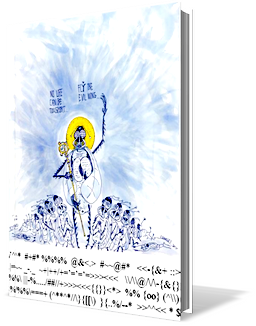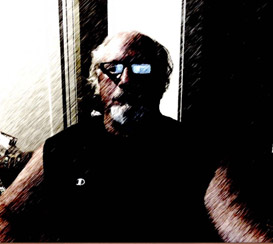About the Book
 The story Flyland, which has created such a disruption in our scientific community, was translated from the ancient Bhuti Fly language, the written and spoken language of common flies. The original fly text was deciphered by a team of Nobel laureate researchers and world renown linguists working at the Lawrence Livermore Labs located in Berkeley, California. The ancient fly text known as The Book of Flies Text was magnified, photographed and then transposed by the team. The translation and texting took a bit over five years to complete. The scientists used an inverted Hubble Telescope originally created for NASA by a German manufacturing firm working with magnified electron photography. The first use of the telescope was in the study of nanotechnology and crushing atoms. The Inverted Hubble Telescope using state of the art macro optic lenses revealed that the inner universe of the small was as vast and diverse as the outer universe of galaxies and stars explored by the original Hubble Telescope. The Inverted Hubble Telescope was used in conjunction with the fly translations to magnify the tiny scribed characters of the ancient Bhuti Fly Language. The scribe flies drew their characters on tanned fly wings ripped from the scutums of Bhuti Fly religious zealots. (Gentle reader: Scutum is the scientific term for a fly’s back.) We have come to find out from further finds that these religious fly zealots were the first literate flies of antiquity. The scientists magnified and photographed the ancient fly writings for this scientific and literary investigation and the controversial study of fly literacy began to be discussed around the world.
The story Flyland, which has created such a disruption in our scientific community, was translated from the ancient Bhuti Fly language, the written and spoken language of common flies. The original fly text was deciphered by a team of Nobel laureate researchers and world renown linguists working at the Lawrence Livermore Labs located in Berkeley, California. The ancient fly text known as The Book of Flies Text was magnified, photographed and then transposed by the team. The translation and texting took a bit over five years to complete. The scientists used an inverted Hubble Telescope originally created for NASA by a German manufacturing firm working with magnified electron photography. The first use of the telescope was in the study of nanotechnology and crushing atoms. The Inverted Hubble Telescope using state of the art macro optic lenses revealed that the inner universe of the small was as vast and diverse as the outer universe of galaxies and stars explored by the original Hubble Telescope. The Inverted Hubble Telescope was used in conjunction with the fly translations to magnify the tiny scribed characters of the ancient Bhuti Fly Language. The scribe flies drew their characters on tanned fly wings ripped from the scutums of Bhuti Fly religious zealots. (Gentle reader: Scutum is the scientific term for a fly’s back.) We have come to find out from further finds that these religious fly zealots were the first literate flies of antiquity. The scientists magnified and photographed the ancient fly writings for this scientific and literary investigation and the controversial study of fly literacy began to be discussed around the world.
The first book of ancient fly scriptures known as The Book of Flies was discovered by French scientists in the cave Chavet, near the Pont-D’Arc, on the Ardeche River in France. The minuscule book of fly scripture was encased in the petrified scat of a long extinct cave bear.
While I was working on the poetic translation of The Book of Flies a true miracle occurred. We were informed that an intact collection of additional fly stories, and the only modern one of its kind ever found, had been discovered on an American military base near the Baghdad airport in Iraq. That book would come to be known as, Flyland.
The Translator: Sir Charles N. George Sirtup III

Sir Charles N. George Sirtup III
Excerpt from Flyland
Luckily for Scut, Boil wasn’t listening. He stared across Flyland from the lace hole of his tennis shoe cross trainer, choosing to ignore Scut’s asides as an unconcerned master would disregard a sulking lap dog. Boil could view his entire domain from this vantage point and he put his thoughts into a catchy poem:
Oh beautiful for smog filled skies
of amber acid rains
and purple mountains o’ garbage majesty
above the toxic fruited plains
Scut joined Boil at the lace hole. The mounds of debris were staggered in panoramic rows and spread out like ancient pyramids. They glowed beneath the blinding yellow haze that blurred out the horizon.
Stacked rubbish heaps grew ever skyward and were known to the flies as the Great Rotten Mounds, or The Rotties. Puddles of rancid water gathered beneath them and shimmered on the mud in the glare from the smog drenched sunlight. The poisons and toxicants in the soil dyed the earth a rusty scab red. Plastic bottle discards were scattered everywhere, as far as the compound eye could see, in multiple deposits buried one on top of another between layer upon layer of radioactive, biochemically charged, sediment.
Billions upon billions of fragments of decomposing plastic, crumbled into tiny shards no bigger than a fly wing, lapped ashore in oil saturated waves with every tide. The tops of the debris piles glinted like millions of zircon diamonds, the tacky refractions glittered across the oasis like thousands of incriminating mirrors.
Abandoned cars and dented appliances, mud ruts from the dozer tracks and a sweet, polluted sulphur stink wafted over the vista adding to the ambiance of pristine ugliness and all encompassing unholy desecration.
“Flyland,” Boil sighed, “Gad truly shat his disgrace on thee.
